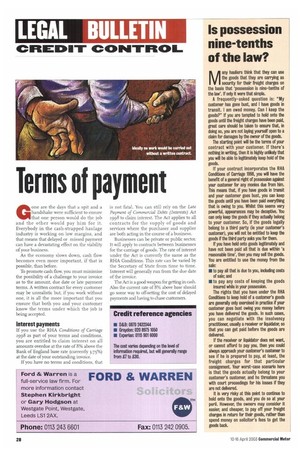Is possession nine-tenths of the law?
Page 28

If you've noticed an error in this article please click here to report it so we can fix it.
Many hauliers think that they can use the goods that they are carrying as security for their freight charges on the basis that 'possession is nine-tenths of the law'. If only it were that simple.
A frequently-asked question is: "My customer has gone bust, and I have goods in transit. I am owed money. Can I keep the goods?" If you are tempted to hold onto the goods until the freight charges have been paid, great care should be taken to ensure that, in doing so, you are not laying yourself open to a claim for damages by the owner of the goods.
The starting point will be the terms of your contract with your customer. If there's nothing in writing, then it is highly unlikely that you will be able to legitimately keep hold of the goods.
If your contract incorporates the RHA Conditions of Carriage 1990, you will have the benefit of a general right of possession against your customer for any monies duo from him. This means that, if you have goods in transit and your customer goes bust, you can keep the goods until you have been paid everything that is owing to you. Whilst this seems very powerful, appearances may be deceptive. You can only keep the goods if they actually belong to your customer. So, if the goods legally belong to a third party (le your customer's customer), you will not be entitled to keep the goods if the third party asks you for them.
If you have held onto goods legitimately and have not been paid all that is due within 'a reasonable time', then you may sell the goods. You are entitled to use the money from the sale: • to pay all that is due to you, including costs of sale; and
'Ito pay any costs of keeping the goods insured while in your possession.
The rights that you have under the RHA Conditions to keep hold of a customer's goods are generally only exercised in practice if your customer goes bust owing you money before you have delivered the goods. In such cases, you can negotiate with the insolvency practitioner, usually a receiver or liquidator, so that you can get paid before the goods are delivered.
If the receiver or liquidator does not want, or cannot afford to pay you, then you could always approach your customer's customer to see if he is prepared to pay, at least, the freight charges for that particular consignment. Your worst-case scenario here is that the goods actually belong to your customer's customer, and he threatens you with court proceedings for his losses if they are not delivered.
It is very risky at this point to continue to hold onto the goods, and you do so at your peril. However, the owners may consider it easier, and cheaper, to pay off your freight charges in return for their goods, rather than spend money on solicitor's fees to get the goods back.








































































































































































